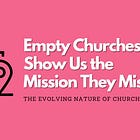Digital Churches Are Not Tools
An Admonition Against Digital Colonization
Since planting a digital church in 2020, there has been a recurring sentiment:
Oh, that’s so nice you’re reaching those people. How will you connect them to a real church?
Some ask this earnestly and innocently; others ask it with vitriol—that the work of the Spirit I have been facilitating is illegitimate.
To their chagrin, this has never and will never be my goal.
Mostly because I believe it to be highly unethical. Stepping into a culture with the goal of assimilation into our culture? That doesn’t sound like the Body of Christ at all—it sounds like the ear wanting to find other ears, as Paul might have put it.
Speaking of Paul, in Acts 17, we read that he stood in the midst of the Areopagus—an unfamiliar space, in a foreign culture—and declared, “I see that you are very religious in every way. For as I walked through your city and looked carefully at the objects of your worship, I even found an altar with this inscription: TO AN UNKNOWN GOD. What, therefore, you worship as unknown, I proclaim to you.”
Paul didn’t go to Athens to build a brand.
He didn’t set up a synagogue with his name on the sign.
He went because God was already there.
His role wasn’t to extract followers into a new church, but to join in what God was already doing in that culture, to proclaim the good news of Jesus in their language, in their context, with humility and love.
God Is Already There
In the United Methodist denomination, of which I am an ordained Elder, we are a connectional people. We believe the Church is not an isolated institution, but a web of relationships—a body bound together by love, accountable to one another, and sent into the world for transformative service.
We affirm that prevenient grace is at work everywhere—yes, even in Twitch chats, Discord servers, YouTube streams, and TikTok feeds.
But too often, churches enter digital spaces not as ministers, but as colonizers. We see digital platforms as tools for growing our church:
We want more views on our livestream.
We want more followers for our brand.
We want people to leave their online communities and join our programs, our streams, our spaces.
This is not evangelism. This is empire.
Doing Church With, Not To
At Checkpoint Church, we approached digital ministry differently.
We didn’t build a Twitch channel and expect people to come to us. We entered Twitch because it is a culture in itself, a space where people already gather, with its own language, rhythms, and values.
We learned the culture, listened to the community, and built relationships—not to pull people into the “First Church down the road,” but to be the Church with them, right there.
This is the difference between colonizing and incarnating in digital spaces.
Let me be clear: this is not a critique of ministries like Savepoint, which help equip existing churches to welcome nerd communities. That’s a different—and vital—task: supporting congregations in extending hospitality within their contexts.
Invitational ministry is still certainly needed, and it is helpful to be prepared when it arrives. I applaud those efforts. A distinct difference here is that this is preparing a place for those who are different from the existing culture, not forcing people to join our thing.
But the work of empire—the temptation to use digital tools for our institutional growth—must be named and resisted.
Intentional Ministry in Culture
If you’re a church leader or pastor:
Ask hard questions. Are we using digital platforms to make disciples of Jesus Christ, or to build our brand?
Resist extraction. Are we trying to pull people from their spaces into ours—or are we joining them where they are?
Listen deeply. Do we understand the culture we’re engaging with? Are we taking time to learn their language, values, and rhythms before speaking?
Celebrate connection. Are we valuing relationship over metrics, friendship over followers?
The world—every pixel of it—is our parish.
Not for us, but for God. Let’s show up not to conquer, but to connect. Not to build our kingdom, but to reveal God’s.
Digital churches are not tools to grow the “real” church. They are the Church, when we approach them with humility, presence, and love.
So let’s stop colonizing digital spaces.
Let’s go, like Paul, into the Areopagus—not to make it ours, but to point to the Unknown God, already at work, already present, waiting to be named.
World 3-12 Complete
Q: What’s a digital native’s favorite hymn?
A: Blest Be the Tweet That Binds




